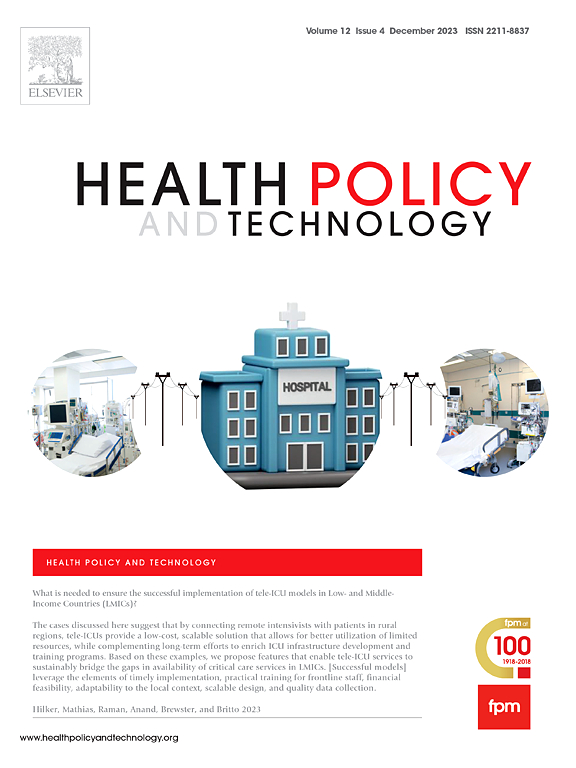精准公共卫生的出现和未来:范围审查
IF 3.7
3区 医学
Q1 HEALTH POLICY & SERVICES
引用次数: 0
摘要
目的大数据和技术在医疗保健领域的快速应用正在改变医学和公共卫生的方法论能力,催生出精准公共卫生等新领域。我们将精确公共卫生概念化为一种新兴技术,以理解这一术语的出现及其相关特征。方法对现有的精准公共卫生文献进行整理和分析。在CINAHL、Medline、PubMed、Scopus、Web of Science和b谷歌Scholar中搜索了提到“精准公共卫生”这个短语的英文文档。对结果文件进行了描述性统计分析,以生成精确的公共卫生术语和定义以及文章的作者和资助者特征。数据通过社会技术视角进行分析,这是一种理解技术如何出现并破坏现有系统的方法。结果精密度公共卫生最初定义不清,但目前已趋于稳定。使用新兴的技术概念框架,我们确定了精准公共卫生的特征,包括快速增长、不连贯、未来影响和结果的不确定性以及术语使用的模糊性。新颖性受到了质疑。结论精准公共卫生的定义在不断变化,术语的含义和用途也不尽相同。对精确公共卫生的定义和术语缺乏共识可能会影响研究进展。精确公共卫生的单一定义是无法实现的;然而,定义应该在利益相关者之间进行协商,承认利益相关者价值观和期望之间的异同,并反映研究和政策目标。精准公共卫生是一个新兴领域,通常依赖于以数据为中心的方法,包括人工智能和机器学习,来改善人口健康结果,这可能会破坏传统的循证研究方法和实践。我们对现有文献进行了范围审查,并将精确公共卫生概念化为一种新兴技术,以了解它如何影响循证实践以及精确公共卫生的术语和定义如何随时间变化。目前还没有就最适合该领域的术语和定义达成共识,而且由于缺乏经验证据,因此难以评价未来的潜在影响。如果精准公共卫生要实现其承诺,研究人员和从业人员必须在报告潜在的不确定性、利益和危害方面保持透明。定义还应在精准公共卫生的利益攸关方之间公开和可协商,并反映研究和政策目标。本文章由计算机程序翻译,如有差异,请以英文原文为准。
The emergence and future of precision public health: a scoping review
Objectives
Rapid uptake of big data and technologies in healthcare are transforming methodological capabilities in medicine and public health, giving rise to new fields such as precision public health. We conceptualised precision public health as an emerging technology to understand the emergence of this term and its associated characteristics.
Methods
We undertook a scoping review to collate and analyse existing literature on precision public health. Documents in English that mentioned the exact phrase “precision public health” were searched for in CINAHL, Medline, PubMed, Scopus, Web of Science and Google Scholar. A descriptive statistical analysis was performed on resulting documents to generate an account of precision public health terminology and definitions as well as author and funder characteristics of articles. Data were analysed through a sociotechnical lens, which is an approach for understanding how technologies emerge and disrupt existing systems.
Results
Precision public health was ill-defined at first but is now stabilising. Using an emerging technology conceptual framework, we identified characteristics of precision public health including rapid growth, incoherence, uncertainty about future impacts and outcomes, and ambiguity about use of terminology. Novelty was contested.
Conclusions
Definitions of precision public health are continuously changing, and terms have different meanings and uses. Lack of consensus on definitions and terms for precision public health may impact progress of resarch. A single definitions of precision public health is not achievable; however, definitions should be negotiable among stakeholders, acknowledge similarities and differences between stakeholder values and expectations, and reflect research and policy objectives.
Public interest summary
Precision public health is an emerging field which often relies on data-centric approaches, including artificial intelligence and machine learning, to improve population health outcomes, which potentially disrupt traditional evidence-based research methods and practice. We conducted a scoping review of current literature, and conceptualised precision public health as an emerging technology to understand how it impacts evidence-based practice and how terms and definitions of precision public health have changed over time.
There is currently no consensus around terms and definitions most appropriate for the field and the absence of empirical evidence makes it difficult to evaluate potential future impacts. If precision public health is going to deliver on its promises, researchers and practitioners must be transparent about reporting potential uncertainties, benefits and harms. Definitions should also be open and negotiable among stakeholders in precision public health, and reflect research and policy objectives.
求助全文
通过发布文献求助,成功后即可免费获取论文全文。
去求助
来源期刊

Health Policy and Technology
Medicine-Health Policy
CiteScore
9.20
自引率
3.30%
发文量
78
审稿时长
88 days
期刊介绍:
Health Policy and Technology (HPT), is the official journal of the Fellowship of Postgraduate Medicine (FPM), a cross-disciplinary journal, which focuses on past, present and future health policy and the role of technology in clinical and non-clinical national and international health environments.
HPT provides a further excellent way for the FPM to continue to make important national and international contributions to development of policy and practice within medicine and related disciplines. The aim of HPT is to publish relevant, timely and accessible articles and commentaries to support policy-makers, health professionals, health technology providers, patient groups and academia interested in health policy and technology.
Topics covered by HPT will include:
- Health technology, including drug discovery, diagnostics, medicines, devices, therapeutic delivery and eHealth systems
- Cross-national comparisons on health policy using evidence-based approaches
- National studies on health policy to determine the outcomes of technology-driven initiatives
- Cross-border eHealth including health tourism
- The digital divide in mobility, access and affordability of healthcare
- Health technology assessment (HTA) methods and tools for evaluating the effectiveness of clinical and non-clinical health technologies
- Health and eHealth indicators and benchmarks (measure/metrics) for understanding the adoption and diffusion of health technologies
- Health and eHealth models and frameworks to support policy-makers and other stakeholders in decision-making
- Stakeholder engagement with health technologies (clinical and patient/citizen buy-in)
- Regulation and health economics
 求助内容:
求助内容: 应助结果提醒方式:
应助结果提醒方式:


